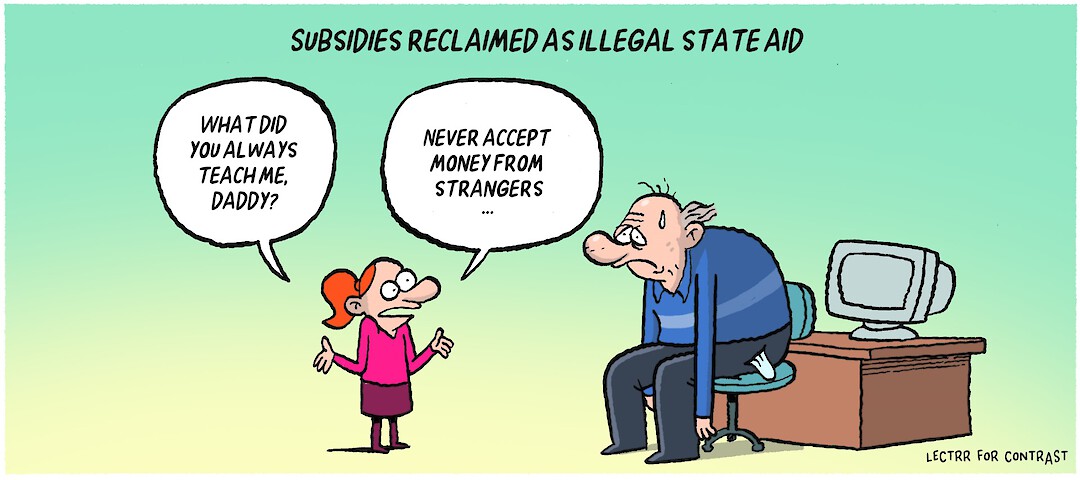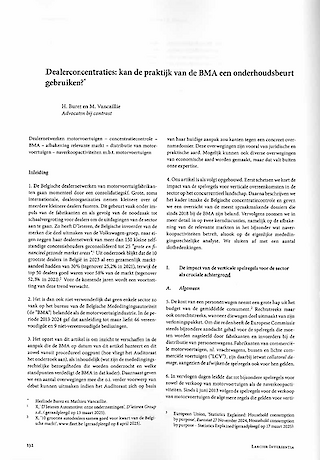In the Picture

Financial aid from the government – helping hand, or potential time bomb?
October 2020Imagine…
A few years ago, your start-up received a sizeable subsidy from the province to help pay for a new production facility. At the time, the province assured you that this subsidy could be paid out without any preliminary formalities, since apparently it enjoyed an “exemption” from the prior notification obligation. Without understanding precisely what this entailed, you took the province at its word and gratefully accepted the subsidy.
Now, several years later, you receive a letter from the province informing you that the subsidy in fact did have to be notified to the European Commission. The province refers to "unlawful state aid" and demands that the subsidy be reimbursed - with interest!
In a panic, you rush to the office of your CFO. The province cannot simply demand that this subsidy be reimbursed with interest, can it? They had assured you that there was no problem! Is there anything you can do to avoid the recovery?
A brief clarification
In Europe, the granting of state aid is subject to strict rules. In principle, all aid has to be notified to the European Commission and has to receive its approval before it can be paid out. The public authority is only exempted from its obligation to notify if the aid meets all of the conditions established by an exemption regulation or decision of the European Commission.
The European Court of Justice has confirmed that aid-granting governments are obliged to recover unlawful state aid if they later discover that one or more of the conditions for enjoying an exemption from the notification obligation were not satisfied. And they must do so on their own initiative, even without a recovery decision pronounced by the European Commission or a judgment from a national judge.
The importance of this obligation must not be underestimated, since case-law from the European Court of Justice clearly demonstrates that there is virtually no valid defence which can be raised by a company when it is confronted with a recovery order.
Reliance on the principle of legitimate expectation – one of the few exceptions to the obligatory recovery of unlawful state aid – offers no solution. The Court has made it clear that not only the aid-granting public authority, but also the beneficiary itself, bears responsibility for verifying whether or not an aid measure must be notified to the Commission.
The start-up from the example above therefore should absolutely not have blindly trusted in the province’s assurances that a notification was not required. The start-up had to examine for itself whether "aid" was involved and, if yes, whether the particular support measure had to be notified to the European Commission for approval.
Thus companies should not, under any circumstances, blithely ignore the state aid rules. In assessing the notification obligation, they stand on the same footing as the aid-granting public authority and they must understand that the financial risk of recovery rests entirely on their shoulders.
Prudence is therefore called for, certainly in this Corona era, when a wide range of support measures are being adopted through which aid is handed out. Better safe than sorry…
Concretely:
- A public authority must, on its own initiative, recover granted state aid if it later determines that the conditions for an exemption from the notification obligation were not fulfilled.
- This obligation applies even if the public authority had earlier assured the beneficiary that the aid measure was exempted from the notification obligation.
- The beneficiary of the aid can in principle not rely on legitimate expectation as a defence against having to return the aid. The beneficiary itself bears the responsibility of verifying whether or not specific aid must be notified to the European Commission.
- If this beneficiary believes – in contrast to the public authority - that a notification is required, it must consult with the public authority on this before accepting the state aid.
Want to know more?
- ECJ 5 March 2019, case C-349/17, Eesti Pagar AS / Ettevõtluse Arendamise Sihtasutus and Majandus- ja Kommunikatsiooniministeerium, ECLI:EU:C:2019:172 (http://curia.europa.eu/juris/document/document.jsf;jsessionid=8472554DE7FEC934073DC922C0074F8F?text=&docid=211287&pageIndex=0&doclang=EN&mode=lst&dir=&occ=first&part=1&cid=9547074)
- For more information about the Eesti Pagar judgment, see S. Engelen and L. Sente, “Eesti Pagar: een duwtje in de rug van steunverlenende autoriteiten en een mes op de keel van begunstigden [a helping hand from aid-granting authorities and a knife at the throat of beneficiaries]”, SEW 2020, February 2020
- For additional information about the recovery of state aid, see https://eur-lex.europa.eu/legal-content/EN/TXT/?uri=CELEX:52019XC0723(01)
- For further information, we also refer to our earlier publication: ‘The public authority is giving your competitor a serious leg up… What to do?’











